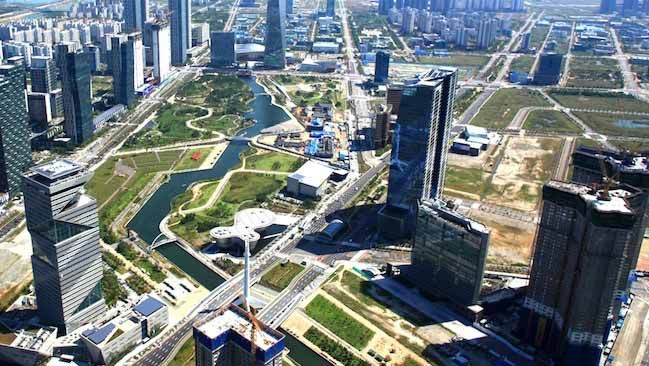- Elegushi Imperial Smart City’s $300 Million Project Broaches New Housing Deal in Lagos
A comprehensive new plan unveiled last week to reverse the growing decline in the nation’s housing stock in the Lagos area, is promising an ambitious new deal for a fresh town project within the Lekki -Epe corridor.
The scope of the scheme is massive and breathtaking, as it anticipates to utilise 200 hectares of sand filled land for a site and services scheme. Other major details are still sketchy, but the promoters disclosed that construction works would start in the second quarter of next year with land reclamation.
Dubbed as the first eco-friendly smart business city in Africa, the project known as Imperial International Business City (IIBC) is promoted through a joint-venture between the Elegushi Royal Family and a private developer, Channeldrill Resources Limited.
The proposed scheme could be accessed through three locations: Freedom road through Lekki Phase 1 (Lekki Third Roundabout); Kunsenla Road by fourth Roundabout of Lekki-Epe Highway and Oba Saheed Ademola Elegushi Road by spare supermarket before Jakande. Another access road is being planned through Femi Okunu by Jakande roundabout.
Specifically, IIBC will be bankrolled through British Foreign Direct Investment of about $300 Million and off plan sales. The city will be zoned into residential, mixed used and commercial areas. Each zone will have low, medium and high density area as well as lagoon/water view area.
About 60 plots are now in the market. The first sets of investors are buying 65,000 per square metres (sqm)plot at N42 million. The project offers different plot sizes. The minimum plot size is 650 sqm.
“The project is the vision of the royal father, Oba Saheed Elegushi to create an international business city which will incorporate the work, live and play theme. The IIBC will expand the Ikate kingdom and also extend Lekki Phase 1. We are making use of the best dredging and architectural companies in the world to accomplish this feat,” according to the managing director, Channeldrill Resources Limited, Mr. Femi Akioye.
The new city plans to integrate smart technologies and distinctive features, which will make it, first self-sustaining eco-friendly smart business district. For instance, real data of traffic flow within the city, the traffic light are connected to sensors that matched the surface traffic congestion (loads on surface transport) to free roads and the sensor also give active surveillance, monitoring and alerts at vantage points within the city (real time adaptive traffic management).
Similarly, smart emergency response, crime prevention (data centre) on demand clique of a bottom availability of emergency support; electricity – smart meters, smart grid and for energy optimization –meters is connected through the home area network (HAN) to advance metering infrastructure (AMI) with wired thermostats that’s connected to the grid.
The technology will help with adjusting electricity to buildings based on consumptions at different time of the day and it helps eradicate blackout or brownout. The conditions of utilities are monitored by sensors.
United Kingdom-based multi-disciplinary firm, Messrs Gensler Associates is executing the town and regional planning aspect of the job, while dredging will be handled by two Belgian companies – Jan De Nul, currently building Dangote Refinery and Dredging International Limited. The reclamation work will take about two years and on completion; the land will be two metres above sea level.
Other consultants are Royal HaskoningDHV (marine engineer and reclamation consultants) and Mott Macdonald (infrastructure engineering consultants) while BAUER Spezialtiefbau GmbH of Germany will build the Shoreline protection.
Proposed amenities include; roads with walk and bicycle way, waterways and lakes, underground drainage, sewage treatment, water and water treatment plant, 1-independent gas fired electricity and cooking gas piped to every house, fibre optics cable, cloud enabled Communication network and smart city/house infrastructure for willing subscribers, an mini golf course and shopping mall.
Meanwhile, the developers have launched Imperial City promo as part of its Corporate Social Responsibility (CSR) and awareness campaign, expected to produce seven land winners every week till December 29 and many other consolation prices in cash.
Akioye said: “We want those on minimum wage, the working class men and women, your hardworking social worker, civil servants, teachers and all other citizens who have been putting in their fair share into commonwealth to be part of this future we talk about.
“For the very affordable fee of N500, you can become a part of the future by buying a raffle ticket for our special draws, which has been approved by the Lagos State Lotteries Board,” he said.

 Billionaire Watch4 weeks ago
Billionaire Watch4 weeks ago


 Naira4 weeks ago
Naira4 weeks ago


 Naira3 weeks ago
Naira3 weeks ago




 Naira3 weeks ago
Naira3 weeks ago




 Naira3 weeks ago
Naira3 weeks ago




 Naira2 weeks ago
Naira2 weeks ago
 Commodities3 weeks ago
Commodities3 weeks ago


 Sport Business4 weeks ago
Sport Business4 weeks ago




















